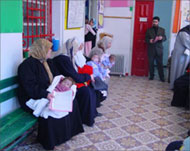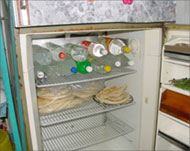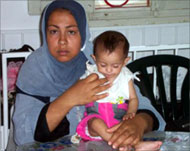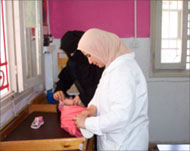Palestinians starve under occupation
At the entrance to the Ard al-Insan clinic in Gaza, also known as the Palestinian Benevolent Association, Iman Jilawi was pleading with programme director Itimad Ghabil.

Her daughter had just been released from the hospital after intestinal surgery, she said, and she did not have the money to pay for a change of the dressing, let alone for her taxi ride home. She was here, though, for another reason: in addition to being ill, her daughter was severely malnourished. And she was not alone.
A cacophony of wails could be heard from within the teeming waiting room. Together with their weary mothers, tens of infants waited to be examined by nurses and nutritionists.
There was Mahmud Sukar, who at eight months weighed in at a mere 4.5 kilograms, and whose family has been surviving on United Nations food coupons set to expire in a few weeks.
And Farah Khalifa, who at 18 months weighed six kilograms.
“I can’t even remember the last time I tasted meat,” said her mother. “My fridge is empty, and my daughter is surviving on my breast milk.”
The problems faced by the visitors to the clinic are confounded by a vicious circle of poverty and unemployment, which makes Ghabil’s job all the more frustrating.
“I don’t know what to do. I can’t help them every time they come in here,” said Ghabil. “They need continuous help.”
Deteriorating nutrition
In the summer of 2002, a landmark study initiated by Care International and Johns Hopkins University, in coordination with Al-Quds University in Jerusalem, found a major problem with the quality of food intake as well as a worrying level of acute malnutrition in children in the Gaza Strip.
 |
|
The clinic is overrun with mothers |
The figures showed that one-fifth of Palestinian children were suffering from malnutrition – a rate more than four times above that of a normally nourished population, according to the study.
“In humanitarian terms it was a percentage that was high enough to trigger some kind of intervention – and that’s what the aid agencies were most interested in,” said project coordinator Dr Gregg Greenough of Johns Hopkins University in an interview with Aljazeera.net.
Chronic malnutrition undermines the immune system and affects the body’s ability to resist and respond to infections and infectious diseases.
It is of particular concern in places where populations are already vulnerable, as those in the Gaza Strip are.
Last month, Greenough returned to Gaza to conclude a follow-up study, with mixed results. While malnutrition in Gaza had gone down, the daily intake of essential macro and micro nutrients had decreased to alarming levels.
“This is something unprecedented. We actually see that as they get older [Palestinian] children are taking in less calories per day. It drops off the charts,” he said.
Poverty
Greenough and his colleagues say the decrease in quality of food intake is directly related to poverty: “Bread is cheap, and tea is cheap,” he says. Malnutrition is not immediately evident in such children, however, because of the body’s self-sustaining nature.
 |
|
Some kitchens contain little more |
“You can feed yourself filler food, such as bread, and preserve your weight and height,” said Greenough.
“What the body will do is lose weight, but not lose height right away. And before you lose weight and height, you decrease energy intake. You might be less attentive at school, for example.”
According to Ard al-Insan, malnutrition prevalence is a late indicator of a crisis precisely because of these reasons. As a result, a significant proportion of Palestinian children may very well be at high risk of malnutrition.
Tenuous relief
While the study did have some promising results – it found that acute levels of malnutrition had dropped in the Gaza Strip to 13% – Greenough is not holding his breath.
Food assistance is a temporary measure for relief, he says, and if taken away, hundreds of vulnerable families will find themselves back in the malnutrition loop.
 |
|
Children suffer weight loss and |
“My concern is that it’s still tenuous, and acute malnutrition could still rise,” said Greenough.
With unemployment steadily on the rise, and income levels for those who are employed decreasing dramatically, Greenough has good reason to worry.
By some estimates, unemployment in general is in excess of 60% in the Gaza Strip, while around 80% of the population is living under the poverty line, with an income of under $2 a day.
In addition, the median monthly income for those who are employed has decreased from $550 before the second intifada to $267 during the first quarter of 2004, a drop of nearly 52%, the Palestinian Central Bureau of Statistics found.
There are also more mouths to feed, according to the World Bank and the United Nations. Whereas in 2000, one worker supported four people in the West Bank and six in the Gaza Strip, the ratios are now seven and nine respectively.
Future prospects
All this has the executive director of Ard al-Insan, Itidal al-Khatib, worried about the future.
Although malnutrition may pose a greater health risk in other countries, in Gaza the situation is aggravated by a military occupation and a jobless economy with the living standard of a developed country.
“With declining incomes and declines in the access to public services, it would not be surprising if we would see evidence of deteriorating nutrition in a short time,” she said.
|
“Mothers of malnourished children are usually also malnourished themselves and absolutely exhausted” Itidal al-Khatib, |
None the less, the clinic has continued with its work, which al-Khatib says revolves around nutritional security from the grassroots up. Active mothers are given training and a certificate upon completion of a nutrition course, and go on to form a support group in their neighbourhood with other vulnerable women.
“Mothers of malnourished children are usually also malnourished themselves and absolutely exhausted.
“It affects her mental capacity. Most mothers that come in here have depression, and their coping mechanisms are not developed, which affects their relationship with their families and children. We try to counsel the entire household so it’s useful without being stigmatic.”
Forced to cope
But Palestinian families have had to resort to severe measures just to ensure their survival, according to recent studies.
Such coping mechanisms have ranged from forgoing medical needs, to decreasing the numbers of meals per day.
 |
|
Mothers skimp on clothes for |
The new Johns Hopkins study has found that two-thirds of the population is not paying or paying less on utility bills in order to purchase food. More than half have given up buying clothes for their children, and 20% forgo buying medications needed for chronic diseases.
And according to Ard al-Insan’s annual report, nine per cent of families in Gaza eat only one meal a day, and another 40% rely on money borrowed from relatives in order to buy their food. Dairy intake has decreased by more than 80%, due to the rising cost of milk.
Some 46.8% of all Palestinian households receive food assistance from agencies. In Gaza, the number is a startling 72%.
Greenough says the situation will not improve in the long-term unless the underlying cause is addressed: poverty.
“I’ve been in some homes and all I’ve seen is water, parsley, and bread,” he said.
“The problem isn’t the food – there’s food out there, but people just can’t buy it. It’s very, very sad.”